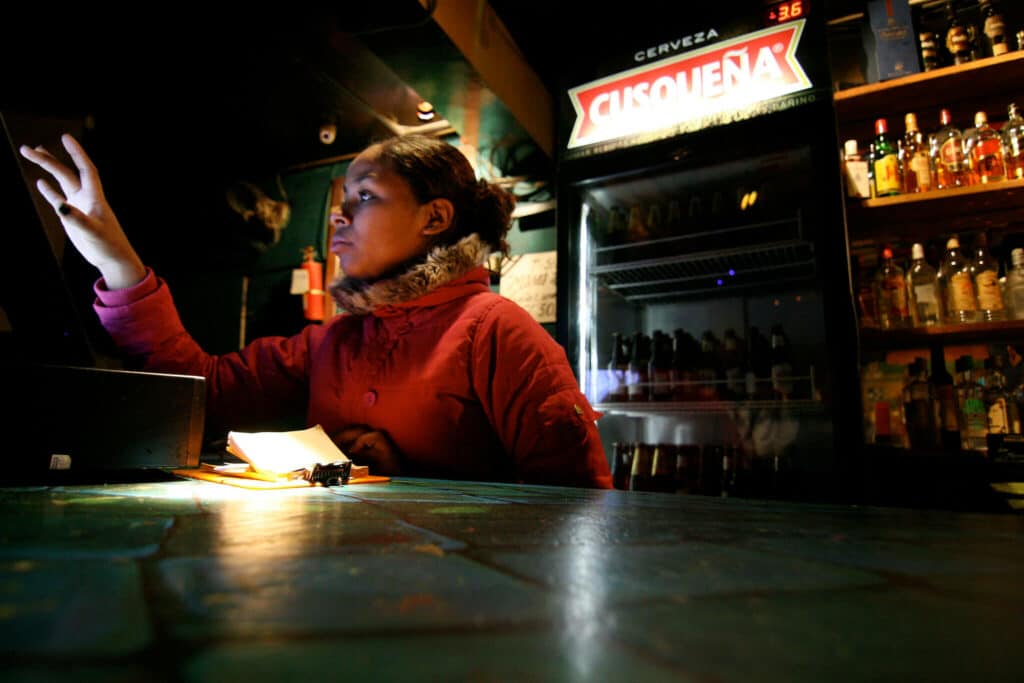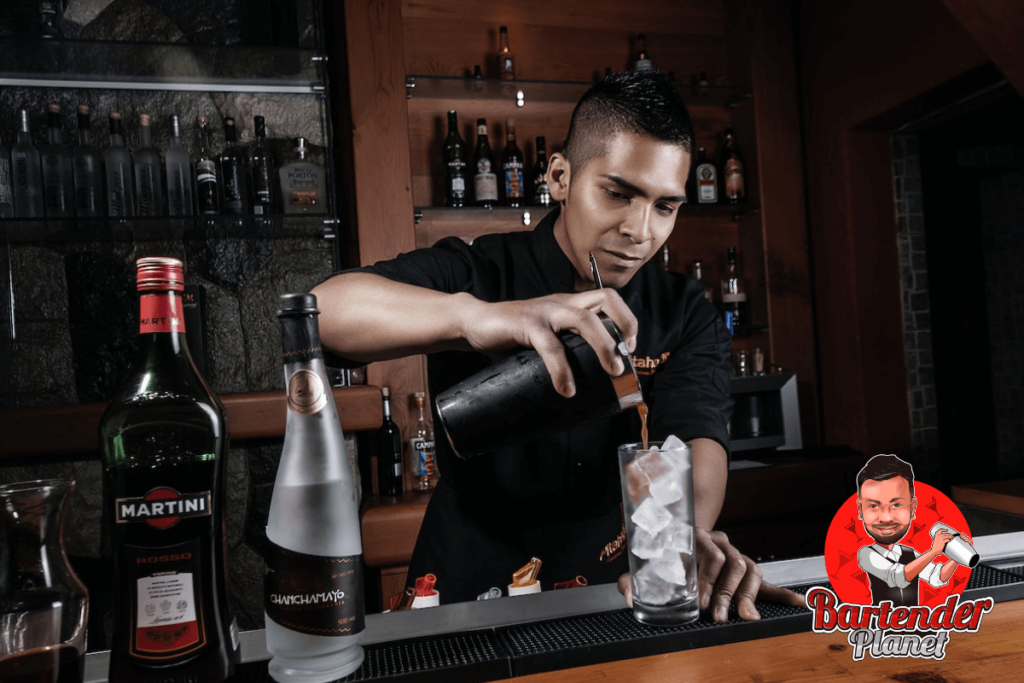When you walk into a bar, the bartender is often the first person you notice. Their confident smile, flair with shakers, and ability to craft the perfect cocktail can easily capture your attention.
But is that all there is to being a bartender? Far from simply mixing drinks, the role of a bartender encompasses a broad range of tasks that extend well beyond the bar counter.
From understanding customer needs to managing inventory, complying with legal regulations, and even playing the role of a therapist, bartender responsibilities are multifaceted and dynamic.
In this post, we’ll delve into the lesser-known aspects of the profession, shedding light on what it truly takes to be a master behind the bar.
Whether you have ambitions of becoming a bartender or you’re simply intrigued by what happens behind the bar, today we’ll cover exactly what to expect from the role of a bartender.
Let’s get into it…
What Are Bartenders Responsible For?
Bartending is far more than the simple act of mixing and serving drinks, that’s only a small part of it; it’s an intricate profession that demands a diverse set of skills and abilities.
Bartenders are the heart and soul of an establishment that set the tone for the customer’s experience, and their responsibilities reach far beyond the bar counter.
They must be knowledgeable, personable, attentive, and even artistic as they navigate a role that involves responsibilities such as:
1. Customer service
Customer service is one of the main and most important responsibilities of a bartender. They are the face of the establishment for many patrons, providing the first and last impressions.
They must greet customers warmly and engage them in friendly conversation, as well as ensure they feel welcome and cared for.
That’s no small task at times!
Bartenders are responsible for responding promptly to requests and showing empathy. They should also provide an enjoyable and memorable experience for all customers in the establishment.
This is super important because quality customer service helps build loyalty and encourages positive reviews, which can contribute to the overall success of the venue.
2. Mixing drinks
Mixing drinks is an art and science combined, requiring a blend of creativity, precision, and technical skill.
Bartenders must know a wide array of recipes, understand the balance of flavors, and often demonstrate flair and style in their preparation.

They need to cater to specific customer preferences as well as modify recipes when requested, and even create signature cocktails that can set an establishment apart from competitors.
Attention to detail, hygiene, and presentation all play crucial roles in this aspect of bartending.
3. Preparing the bar
Preparation of the bar is a foundational task that sets the tone for the entire shift.
This includes cleaning and sanitizing all surfaces and equipment, stocking the bar with adequate supplies of drinks, garnishes, ice, and glassware, and ensuring everything is in its correct place.
Efficient preparation helps in delivering speedy service during busy hours, minimizing stress, and contributing to a seamless workflow.
Bartenders must assess inventory, anticipate demand, and coordinate with other staff as needed.
4. Checking identification
Ensuring that customers meet the legal age requirement for alcohol consumption is a serious responsibility.
Bartenders must carefully check IDs, and be diligent in refusing service to underage patrons.
Mistakes in this area can lead to serious legal consequences for both the bartender and the establishment, making thorough identification checks vital.
Training in recognizing valid identification and being firm yet courteous in enforcement is key.
5. Handling money
The responsibility of handling money involves accurately taking payment for drinks, giving change, managing tabs, and sometimes processing credit card transactions.
This requires attention to detail, honesty, and efficiency. Proper money handling is vital for the financial integrity of the business, and errors can lead to discrepancies that affect profitability.
Bartenders may also need to balance cash drawers and provide accounting at the end of shifts.
6. Compliance with laws and regulations
Bartenders must be well-versed in the local and state laws that govern the sale and consumption of alcohol.
This includes not only age restrictions but also rules about serving limits, hours of operation, and licensing requirements.
Non-compliance can result in fines, legal actions, or even the closure of the establishment.
Continuous education, awareness, and adherence to these laws are fundamental aspects of the profession.
7. Creating a safe environment
Ensuring a safe and comfortable environment involves recognizing and managing potential problems.
Bartenders must monitor customer behavior, refuse service to overly intoxicated individuals, and manage or prevent conflicts among patrons.
Knowledge of first aid and coordination with security personnel can be important, as is maintaining an atmosphere that is inclusive, respectful, and free from harassment or discrimination.
8. Assess customer’s needs
Expert bartenders assess customers’ preferences, tastes, or moods and make personalized recommendations.
Whether guiding a novice through a wine selection or suggesting a cocktail to a connoisseur, understanding the customer’s needs and aligning them with the offerings is a nuanced skill.
It requires deep knowledge of beverages, keen observation, empathetic listening, and a genuine desire to enhance the customer’s experience.
Presenting the bar menu isn’t just about handing over a list of drinks. It includes explaining and promoting various beverages, detailing ingredients, highlighting specials, and often sharing stories or insights that enrich the customer’s choice.
Bartenders may need to describe flavor profiles, provide information on allergens, or offer insights into the origins of unique or local drinks.
It’s an opportunity to upsell, engage, and add value to the customer’s experience.
10. Coordinating with other staff
Bartending is not a solo endeavor; it requires seamless collaboration with waitstaff, kitchen personnel, management, and other team members.

Coordination ensures timely service, accurate orders, and consistent customer experience. Effective communication, understanding of roles, shared objectives, and a team-oriented attitude are essential.
Whether during a busy Friday night rush or a private event, coordination is key to maintaining efficiency, morale, and customer satisfaction.
What Are The Main Requirements & Skills Of A Bartender?
Whilst bartenders have quite a few responsibilities, they also need to have a particular skill set and set of requirements that they meet to be successful in the role.
Let’s take a look at the main requirements and skills of a bartender:
Age Requirement
First and foremost, you must meet the age requirement to serve alcohol, typically either 18 or 21, depending on local laws.
This age restriction ensures that those serving alcoholic beverages have a certain level of maturity and awareness of the responsibilities involved.
Regulations differ across regions, states, or even cities, and it’s important for aspiring bartenders to be aware of and comply with the specific rules that apply to their location.
Licensing/Certification
In certain jurisdictions, bartenders must obtain a special license or certification that demonstrates their understanding of responsible alcohol service.
This typically involves taking a course that covers subjects such as alcohol laws, safe serving practices, how to handle intoxicated patrons, and sometimes even basic first aid.
Licensing ensures that bartenders have the knowledge needed to create a safe and legal drinking environment.
It emphasizes professionalism within the industry and helps protect both the establishment and its customers from potential issues related to alcohol consumption.
Physical Ability
Being a bartender is physically demanding, and I say that from experience.
You’ll be standing for long periods, moving quickly during busy times, and lifting heavy items like kegs or crates of bottles.
The constant hustle and physical labor require a certain level of fitness and endurance.
Agility and strength enable bartenders to perform their duties effectively without excessive fatigue or risk of injury.

It’s not just about brute force; good hand-eye coordination and fine motor skills are also vital for delicate tasks like garnishing and pouring.
Skills
So, you’re all set with the responsibilities and requirements of bartending, but what about the personal skillset that is most desirable?
Well, having the below skills will make you stand out from the crowd and will put you in good stead to land a job as a bartender.
But don’t worry if you don’t have all of them right now, they can be developed on the job and through the training process.
- Communication Skills: Talking clearly with customers and other staff and listening well so orders are right and people feel understood.
- Customer Service Skills: Being friendly and quick to help so customers have a good time.
- Mixology Skills: Knowing how to make different drinks, including what goes in them and how to make them look good.
- Multi-tasking Skills: Being able to do many things at once, like taking orders, making drinks, and handling money.
- Attention to Detail: Be careful and precise, whether you’re following a drink recipe or counting change.
- Problem-Solving Skills: Figuring out what to do if something goes wrong, like a difficult customer or a missing ingredient.
- Sales Skills: Sometimes, you’ll need to talk customers into trying special drinks or buying something extra.
- Teamwork Skills: Working well with other people at the place, like servers and cooks, so everyone’s orders are right and come out on time.
Final Thoughts
To wrap up, the role of a bartender extends far beyond the mixing and serving of drinks.
They’re not just there to pour your favorite cocktail; they’re responsible for making sure the bar is a fun, safe, and welcoming place.
From checking your ID to making sure they have all the right things ready to make the drinks you love, bartenders do a lot more than we might think.
They work with other staff, follow the laws, and handle money too. Next time you’re enjoying a night out, think about all the things your bartender is doing to make your evening great.
It’s a tough job, but someone’s got to do it, and we love it!
See you next time!
Get Certified🍸
Take your mixology game to the next level! With this advanced mixology course, you’ll learn not just to follow recipes, but to create them.
HD Videos
Cheat Sheets
Earn Your Certificate



